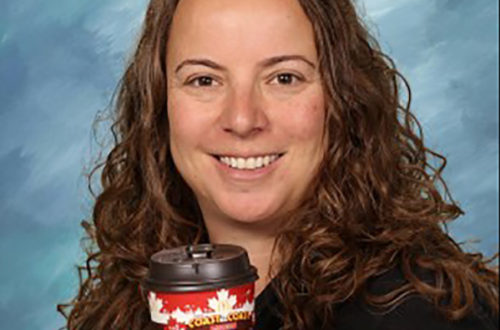Journal of the Mathematics Council of the Alberta Teachers’ Association
Volume 41 Issue 1, February 2004
Farewell and Welcome to the New Editor
As I write this editorial, I am fully aware that it is my last one. It will be January/February 2004 by the time you receive this issue. My successor will assume the editorship with the spring 2004 issue. Please send all future delta-K submissions to A. Craig Loewen, Editor, delta-K.
I cannot help but have mixed feelings about retiring from the editorship because I have truly enjoyed editing delta-K for the past eight years. My enjoyment was largely derived from several sources. Networking with many of the contributors was one important source and always professionally rewarding. Their submissions were interesting to read and contributed to my own professional growth immensely.
Working with the executive of the Mathematics Council of the Alberta Teachers’ Association (MCATA) was the most satisfying experience. Comprising representatives from the teaching profession, the University of Alberta Faculty of Education and mathematics department, Alberta Learning and the Alberta Teachers’ Association (ATA), all members were dedicated and gave generously of their time to achieve the mission, which is providing leadership to encourage the continuing enhancement of teaching, learning and understanding mathematics. The feedback and suggestions received from the executive are largely responsible for making delta-K such an invaluable resource for mathematics educators in Alberta as well as in other Canadian provinces and many states in the United States.
Working with the Document Production staff of the ATA has been a most pleasant experience for me. Each one of the staff members is dedicated and committed to producing an end product that is of the highest quality. The creation of delta-K from start to finish is very complex, involving many people-authors, editors and Document Production staff. There is no doubt that the Document Production staff deserves our collective commendation and much of the credit in producing a professionally looking journal.
To maintain a high quality mathematics journal or enhance the quality of delta-K, thereby making it an important vehicle for communicating teaching and learning experiences in mathematics, it must contain relevant content for our readers. This can only be achieved with your help. We all know that good things are happening in the mathematics classrooms of our schools, colleges and universities. It is important that they do not go unnoticed and that they are shared with our readers. It is in that spirit that I urge you-teachers, students, graduate students, and college and university teachers-to submit manuscripts for inclusion in delta-K.
delta-K must become a journal written by teachers for teachers. Every section of delta-K is open for submissions. Those of you who do not have time to write a feature article may choose to share a teaching idea or comment on something that has been written in a previous issue. Student projects are produced in every high school mathematics classroom in Alberta, yet few student projects are submitted for publication. Please read the editor’s comments under Student Corner for direction.
delta-K allows everyone to share his or her experiences in teaching/learning mathematics. Please consider making a contribution to delta-K. Only through your active participation can the editor plan, design and produce a mathematics journal that is relevant, meaningful and a useful resource for mathematics educators.
Thank you for the opportunity to work with so many dedicated people. It has been a real pleasure working with you and being the editor of delta-K.
Klaus Puhlmann
1-3
4
Farewell and Welcome to the New Editor
Klaus Puhlmann
5
Cynthia Ballheim
6
Deanna Shostak
7 – 9
Klaus Puhlmann
10 – 14
NCTM MCATA 2003 Regional Conference
Cynthia Ballheim
15
Some Processes for Changing Curriculum Beg Revisiting
Werner Liedtke
16 – 20
Why Do Numerate Students Adults Lack Conceptual Understanding of Division?
Werner Liedtke
21
22 – 24
NCTM Standards in Action The Content Standard:Data Analysis and Probability
Klaus Puhlmann
25 – 27
The Probability of Winning a Lotto Jackpot Twice
Emeric T. Noone
28 – 30
Teaching the Mean Meaningfully
John C. Uccellini
31 – 35
Problem Solving: Dealing with Data in the Elementary School
Harry Bohan, Beverly Irby and Dolly Vogel
36
Art Jorgensen
37 – 46
Activities for the Middle School Math Classroom: Games and Problem Solving
A. Craig Loewen
47 – 50
About Integration in Teaching College Mathematics and Computer Programming
Yuri Yatsenko
51- 52
Student Projects in the Educational Process
Natali Hritonenko
53 – 57
Edmonton Junior High Mathematics Contest 2001
Andy Liu
58 -63
Fun with Mathematics Challenging the Reader
Andy Liu
64 – 67
Infinite Sets and Georg Cantor
Sandra M. Pulver
68 – 71
On Vectorial Proofs, Circumradii and Equilateral Triangles
David E. Dobbs
72 – 75
Fractions Are Much More Than Pies
Jerry Ameis
76- 77
Considering Correlation Coefficients: The Meaning of Zero Correlation
Bonnie H. Litwiller and David R. Duncan
78 -80
Lessons Learned from Looking Inside the Classroom
Nancy Drickey
81
Geometry in Landscaping What’s the Diameter?
Klaus Puhlmann
82 – 84
Gauss and the Regular Heptadecagon
William Dunham
85



